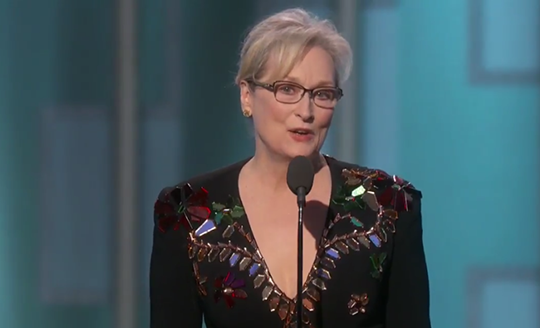Meryl Streep brought the house down at Sunday night's Golden Globes as she accepted the Cecil B. DeMille award for lifetime achievement. Though many other presenters and winners, plus host Jimmy Fallon, brought up the political division that has been simmering in America lately, nobody did it like Streep.

After an emotional introduction from Viola Davis, Streep spoke about the role actors, and the press, have to play in a Trump administration. She also took time to reference her fellow actors and how they bring different perspective and backgrounds to their art. And at the end, she gave a tribute to her late friend, Carrie Fisher, who always had the right thing to say when times got tough.
Watch Streep's speech below:
At tonight's #GoldenGlobes we honor Hollywood legend Meryl Streep with the prestigious Cecil B. Demille Award. pic.twitter.com/dxpeCDNXY6
— Golden Globe Awards (@goldenglobes) January 9, 2017
And read the full transcript here:
"Thank you very much. Thank you very much. Thank you. Please sit down. Please sit down. Thank you. I love you all. You'll have to forgive me. I've lost my voice in screaming and lamentation this weekend. And I have lost my mind sometime earlier this year. So I have to read.
Thank you, Hollywood foreign press. Just to pick up on what Hugh Laurie said. You and all of us in this room, really, belong to the most vilified segments in American society right now. Think about it. Hollywood, foreigners, and the press. But who are we? And, you know, what is Hollywood anyway? It's just a bunch of people from other places.
I was born and raised and created in the public schools of New Jersey. Viola [Davis] was born in a sharecropper's cabin in South Carolina, and grew up in Central Falls, Rhode Island. Sarah Paulson was raised by a single mom in Brooklyn. Sarah Jessica Parker was one of seven or eight kids from Ohio. Amy Adams was born in Italy. Natalie Portman was born in Jerusalem. Where are their birth certificates? And the beautiful Ruth Negga was born in Ethiopia, raised in -- no, in Ireland, I do believe. And she's here nominated for playing a small town girl from Virginia. Ryan Gosling, like all the nicest people, is Canadian. And Dev Patel was born in Kenya, raised in London, is here for playing an Indian raised in Tasmania.
Hollywood is crawling with outsiders and foreigners. If you kick 'em all out, you'll have nothing to watch but football and mixed martial arts, which are not the arts. They gave me three seconds to say this. An actor's only job is to enter the lives of people who are different from us and let you feel what that feels like. And there were many, many, many powerful performances this year that did exactly that, breathtaking, passionate work.
There was one performance this year that stunned me. It sank its hooks in my heart. Not because it was good. There was nothing good about it. But it was effective and it did its job. It made its intended audience laugh and show their teeth. It was that moment when the person asking to sit in the most respected seat in our country imitated a disabled reporter, someone he outranked in privilege, power, and the capacity to fight back. It kind of broke my heart when I saw it. I still can't get it out of my head because it wasn't in a movie. It was real life.
And this instinct to humiliate, when it's modeled by someone in the public platform, by someone powerful, it filters down into everybody's life, because it kind of gives permission for other people to do the same thing. Disrespect invites disrespect. Violence incites violence. When the powerful use their position to bully others, we all lose.
This brings me to the press. We need the principled press to hold power to account, to call them on the carpet for every outrage.That's why our founders enshrined the press and its freedoms in our constitution. So I only ask the famously well-heeled Hollywood Foreign Press and all of us in our community to join me in supporting the committee to protect journalists. Because we're going to need them going forward. And they'll need us to safeguard the truth.
One more thing. Once when I was standing around on the set one day whining about something, we were going to work through supper, or the long hours or whatever, Tommy Lee Jones said to me, isn't it such a privilege, Meryl, just to be an actor. Yeah, it is. And we have to remind each other of the privilege and the responsibility of the act of empathy. We should all be very proud of the work Hollywood honors here tonight.
As my friend, the dear departed Princess Leia, said to me once, take your broken heart, make it into art. Thank you."





Comments
Add new comment